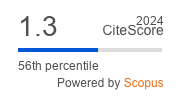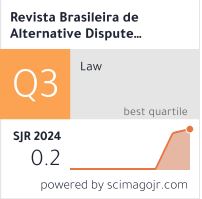Jurisdictional Conundrum in Digital Banking Frauds
Reinvestigation of the Effectiveness of International Conventional Laws vs. Contemporary Approaches on Cyberspace
DOI:
https://doi.org/10.52028/rbadr.v7.i13.ART13.INKeywords:
Alternative Dispute Resolution, Jurisdiction, Electronic banking, Electronic commerce, TransactionAbstract
Using a digital banking platform is crucial and unavoidable and as a result, it is essential to think about the possible legal repercussions of the expansion and development of electronic banking. However, the absence of online dispute-resolution systems will pose a significant barrier to expanding electronic banking. With this in mind, it proposes that the expansion of electronic banking can be maximized by adopting an online alternative dispute resolution (OADR) system, which it claims will replace traditional forms of ADR such as arbitration and mediation. This study contends that the potential for and methods of resolving conflicts arising from online activity, especially in the commercial setting, has expanded in recent years. Alternative dispute resolution mechanisms are much more critical than ever since the Internet has quickly made it possible to undertake minor transactions across jurisdictional borders. This paper makes a strong case for the use of OADR systems in e-commerce and cyberwarfare jurisdiction, and it puts forth the idea that rapidly developing digital technological frauds, especially in the banking sector, are essential in giving internet users access to facilities for dispute resolution, mainly when stakeholders are situated in various jurisdictions.
References
AURELIO, Lopez Taruella. Cross-Border Disputes on Online Consumer Contracts in the European Union, the Brussels Convention, the Brussels Regulation and the Role of Alternative Dispute Resolution Systems, Journal of Indus Network, vol. 2, pp. 231-267, 2001.
CHRISTINE, Lecuyer Thieffry; PATRICK, Thieffry. Negotiating Settlement of Dispute Provisions in International Business Contracts: Recent Developments in Arbitration and Other Processes, International Business Law Journal, vol. 45, n. 2, pp. 577-602, 1990.
DAN L., Burk. Trademarks Along the Infobahn: A First Look at the Emerging Law of Cybermarks, Journal of Law and Technology, vol. 1, 1995.
DUNCAN, Bentley; JOHN, Wade. Special Methods and Tools for Educating the Transnational Lawyer, Journal of Legal Education, vol. 55, pp. 479-83, 2005.
FRANK, Sander; STEVEN, Goldberg. Fitting the Forum to the Fuss: A User-Friendly Guide to Selecting an ADR Procedure, Journal of Negotiation, vol. 10, n. 1, pp. 49-68, 1994.
GIBBONS, L; Private Law, Public Justice: Another Look at Privacy, Arbitration, and Global E-Commerce, Journal of Dispute Resolution, vol. 15, pp. 217-237, 2000.
HENRY, H; PERRITT, Jr. Dispute Resolution in Electronic Network Communities, Villanova Law Review, vol. 38, pp. 349-359, 1993.
JASNA, Arsic. International Commercial Arbitration on the Internet: Has the Future Come Too Early, Journal of International Arbitration, vol. 14, n. 3, pp. 216-217,1997.
JEREMY, Gilman. Personal Jurisdiction and the Internet: Traditional Jurisprudence for a New Medium, Business Lawyer, vol. 56, pp. 395-400, 2000.
JUERGEN, Noll. European Community, and E-commerce: Fostering Consumer Confidence, Electronic Communication Law Review, vol. 9, pp. 207, 2002.
KATHLEEN, Goodrich; ANDREA, Kupfer Schneider, The Classroom Can Be All Fun and Games, Ohio State Journal on Dispute Resolution, vol. 25, pp. 87, 2009.
KEITH H, Hirokawa. Critical Enculturation: Using Problems to Teach Law, Drexel Law Review, vol. 2, n. 1, pp. 1, 2009.
LEAHY, Edward R.; BIANCHI, Carlos J. The changing face of international arbitration. Journal of International Arbitration, v. 17, n. 4, 2000.
MICHAEL, Moffit. Lights, Camera, Begin Final Exam: Testing What We Teach in Negotiation Courses, Journal of Legal Education, vol. 54, n. 1, pp. 91, 2004.
PAOLO, Contini. International Commercial Arbitration: The United Nations Convention on the Recognition and Enforcement of Foreign Arbitral Awards, American Journal of Comparative Law, vol. 18, no 3, pp. 283,1959.
PAPPAS, Brianb. Online Court: Online Dispute Resolution and the Future or Small Claims, Journal of Law and Technology, vol. 28, n. 2, pp. 24-25, 2008.
SCHMITZ, Amy J. Drive-Thru Arbitration in the Digital Age: Empowering Consumers Through Binging ODR, Baylor Law Review, vol. 62, pp.178, 2010.
SHEKHAR, Kumar. Virtual Venues: Improving Online Dispute Resolution as an Alternative to Cost Intensive Litigation, Marshall Journal of Information and Technology, p. 81-89, 2009.
SUSAN, Exon. Maximizing Technology to Establish Trust in an Online, Non-Visual Mediation Setting, La Verne Law Review, vol. 33, n. 27, pp. 63-65, 2011.
TODD D, Weinstein. A Solution for Personal Jurisdiction on the Internet, Louisiana Law Review, vol. 59, pp. 565-568,1999.
VANDENBERG, Albert Jan. Non-Domestic Arbitral Awards Under the 1958 New York Convention. International Journal of Arbitration, vol. 2, n. 3, pp. 191,1986.
Books
ALAN, Redfern; MARTIN, Hunter; Law and Practice of International Commercial Arbitration. 3rd ed. Sweet & Maxwell London,1999.
DEAN, Pruitt; Conflict Escalation, Stalemate, and Settlement. 3rd ed. Mcgraw-Hill Book Company, 2004.
CHRISTOPHER, W. Moore; The mediation process: practical strategies for resolving conflict. 3rd ed. John Wiley and Sons, 2003.
JANICE, Nadler; DONNA, Shestowsky; Negotiation, Information Technology, and the problem of the faceless other. L. Thompson, 2006.
ROY, Goode; Commercial Law. 2nd ed. Penguin Books Ltd. London, 1995.
Downloads
Published
Issue
Section
License
Copyright (c) 2025 Revista Brasileira de Alternative Dispute Resolution - Brazilian Journal of Alternative Dispute Resolution - RBADR

This work is licensed under a Creative Commons Attribution 4.0 International License.
No royalties or other compensation shall be due for the publication of the works.
The opinions expressed by the authors of the articles and reviews are their sole responsibility.









